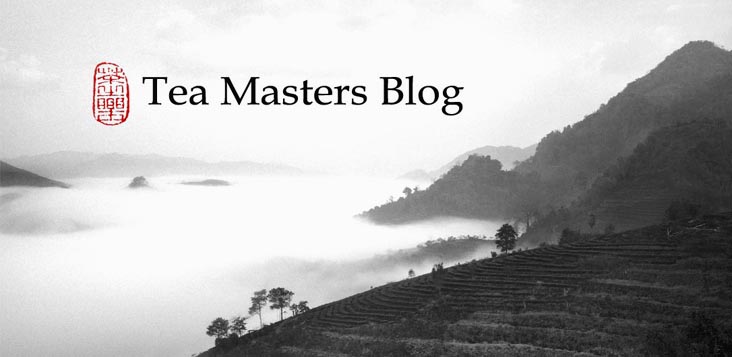I think that Mick must have liked last July's 3 tea classes, because he came back to see me for 3 new classes! He was very intrigued by my Wuyi teas and wanted to try some with me to better understand the true taste of Yan Cha.
I started by showing him 3 Shui Xian. The one on the right is heavily roasted (let's call this the Hong Kong style). The one in the middle has beautiful big leaves and is only lightly roasted even if it's not very apparent here. The one on the left is medium roasted.
It isn't difficult at all to recognize which one was the best (and truly from Wuyi). Already the smell is so nice and natural that it makes you smile and stimulates your taste buds.
We compared all 3 teas in my mini gaiwan. The first 2 ShuiXian were tasting pretty good on their own. One had chocolate flavors and a dark notes, but little bitterness, from its strong roast. The second one had a pleasant fresh fruity aroma.
But they were no match in terms of aftertaste with the third. Simply blown away! Mick notices that the tea starts very lightly, almost as if it were simply hot water, but that the taste then coats the whole mouth and throat. It keeps on lingering, evolving into new scents and waves of stimulation on the palate. There was nothing comparable in the other 2 teas in terms of aftertaste.
Yan Gu Hua Xiang. Mineral taste and scent of flowers is Teaparker's favorite idiom to describe YanCha's characteristic.
The roast is not overwhelming the pure aromas of the Wuyi mountain, but it does provide a backbone to the tea that emphasizes the mineral taste of the leaves.
It's not difficult to appreciate how different and superior true Yan Cha tastes. What's difficult is to find it! So little is produced by so many farmers...
On the second day, we had an interesting class about Yixing teapots. We compared a duanni, 2 zisha and a zhuni teapot vs a porcelain gaiwan with the same tea to taste how the teapot impacts the brew.
On the third day, Mick wanted to experience the secret taste of Wuyi once again. Since a good roasting is part of the equation, we started by comparing 2 Shan Lin Xi Oolongs.
First a fresh one, without roast.
Then one with a light roast and aged. Deeper, more mature notes develop, but they don't entirely overwhelm the freshness of the tea.
Nature's aromas must be emphasized by the roast, not covered...
We finish our third and last class with a jewel, a BeiDou No1 Yan Cha brewed in a flat zhuni teapot. Mick had liked the Wuyi teas from the first class so much that he insisted on tasting more of them in this third class.
The name of this tea describes the location where it was planted and the No 1 refers to the fact that this is a clone of the first bush of DaHongPao. This is as close as it gets to the legendary taste of the big red robe tea.
Mick felt that it is difficult to describe all the aromas of this tea, but that this would inspire a poet! It's no wonder there are so many Chinese poems about Yan Cha!
Tasting a real Yan Cha is akin to swallowing the blue and the red pill in Matrix. First, you get to experience bliss and the ultimate refinement in tea, but then you wake up and realize that very few teas come close to this level of harmony and delightful aftertaste.
Then comes the other reality: such tea is extremely rare and hard to find. (I can't sell Yan Cha on www.tea-masters.com because I simply don't have enough of it). That's why I've thought of another idea to share it with my most supportive readers/customers: This spring, I'll give a 2 gr Yan Cha sample and a mini gaiwan for free for (retail) orders in excess of 500 USD.
The other possibility is to do what Mick and his wife did: book a (tea) master class with me in New Taipei City when you come visit Taiwan. (Contact me at: stephane_erler@yahoo.com)
Greengold white-green tea
1 day ago

























1 comment:
Thank's for your nice article about our 3 classes, I still feel the aroma offm the yan cha and makes me want to write a poem, look forward, Mick
Post a Comment